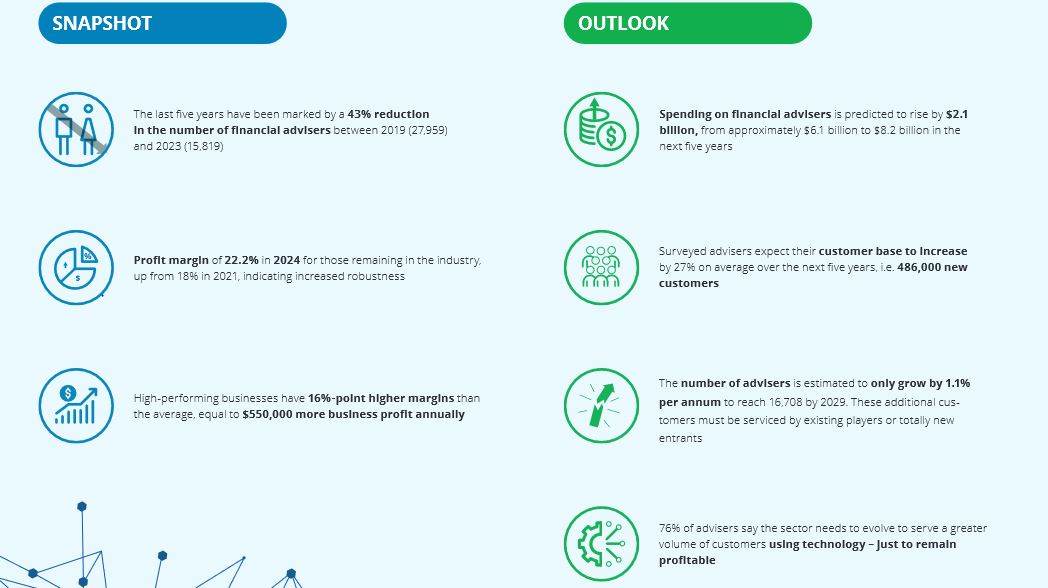Advisers are being urged to proactively adapt to changes in clientele, products, technology, and business structure to stay competitive, in a new report from Deloitte Access Economics in collaboration with Iress.
The Advice 2030: The Big Shift report identifies seven megatrends that it says are set to shape the future of financial advice, anticipating that shifts in competition, climate impacts, demographics and client priorities “…will generate greater demand for specialised financial advice delivered through a customer-centric, technology-led offering.”
The seven external megatrends Deloitte identified that will influence the sector over the coming years are:
- Skyrocketing retirement demand
- Natural disasters and environmental volatility
- The new Australian dream — driven by housing unaffordability
- Digital delivery – of everything
- Inter-generational wealth transfer – ‘the grey tidal wave’
- Riding the green wave of future investing
- The rise of digital assets and product proliferation

The report says Australia’s advice industry has the potential to grow from $6.1 billion in revenue to $8.2 billion by 2030, which is contingent on advisers scaling up to serve an expected 486,000 new customers.
Additionally, it says, consumers are demanding a broader set of advice support across retirement, inter-generational wealth transfer, wealth accumulation outside of the family home, natural disaster resilience and digital assets.
“Beyond traditional advice, opportunities abound to tap into the estimated 11.8m Australians with unmet advice needs through scaled and digital advice offerings,“ a statement from the two companies states.
They note that the Australian financial advice industry has been characterised by significant internal upheavals, including a 43% decline in advisers, major institutions selling their advisory arms, regulatory reforms and decreased trust in the industry.
…Those advisers which have remained in the industry have proven to be remarkably resilient, and have seen profitability rebound…
“Those advisers which have remained in the industry have proven to be remarkably resilient, and have seen profitability rebound to be generating 22% profit margins, with high performing advice practices able to achieve even higher margins representing $550,000 more in business profits annually.”
While acknowledging the resilience of these advisers, the report outlines a suite of external factors that will “…profoundly impact the industry and act as stimuli for advisers to shift how their advice is delivered.”
Rice Warner, which is part of Deloitte, estimated that if all Australians could access better advice that resulted in a 1% p.a. increase in their asset returns, the pool of national savings would be $2 trillion higher in 30 years.
“This presents a compelling case for the advice industry to invest in fit-for-purpose strategies that cater for a broader client base, in support of greater economic prosperity and a thriving financial advice sector.”
Deloitte Access Economics Finance Lead Partner John O’Mahony says that while the ‘big shift’ will transform the competitive landscape of the advice industry, advisers have agency to ready themselves for the future.
He says that to take advantage of a changing future, advisers need to make choices today that can best service evolving customer needs across the Australian market.
…Advisers can avoid being edged out in an increasingly competitive sector by adapting and perfecting their unique customer profile, business model, specialised advice capabilities and technology selection…
“Advisers can avoid being edged out in an increasingly competitive sector by adapting and perfecting their unique customer profile, business model, specialised advice capabilities and technology selection. By embracing the megatrends and mapping their practice against the current landscape, advisers can carve themselves a sustaining market position,” he says.
Seventy six percent of the surveyed Australian financial advisers agree the sector needs to evolve its use of technology to help service a growing client landscape.
Iress CEO Marcus Price says proactive advisers can adapt and improve their practices by harnessing advanced technology and developing an acute awareness of their clients’ changing needs.
“The findings of this research are compelling – despite a number of challenges in the industry over the past few years, advice revenue is forecast to grow substantially over the next five years driven by strong consumer demand. What’s clear though is that advice business models must evolve to capture this demand effectively, as well as adapt to better reflect the breadth of needs from consumers. “
Click here to access the complete report.






